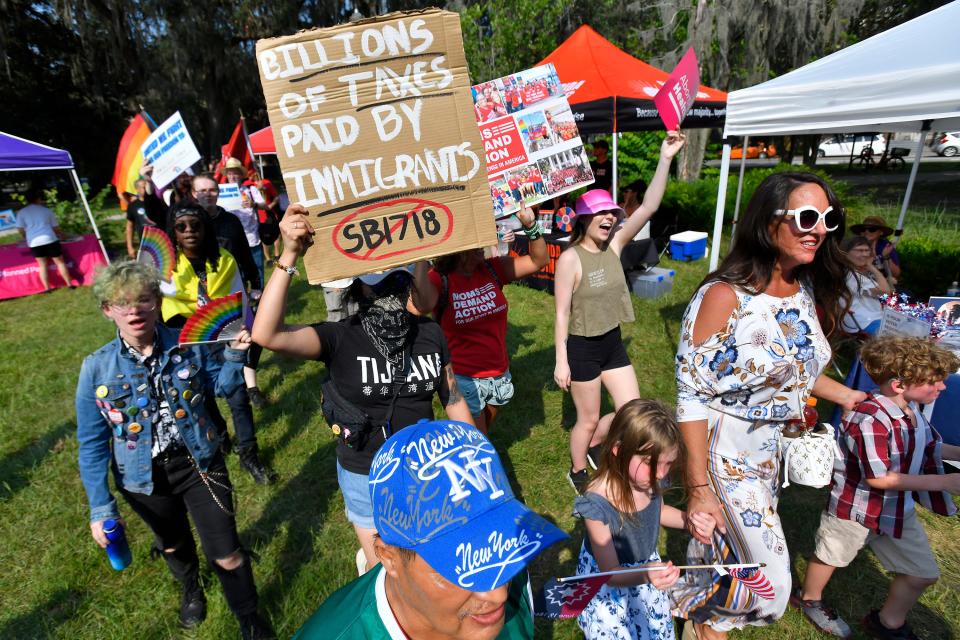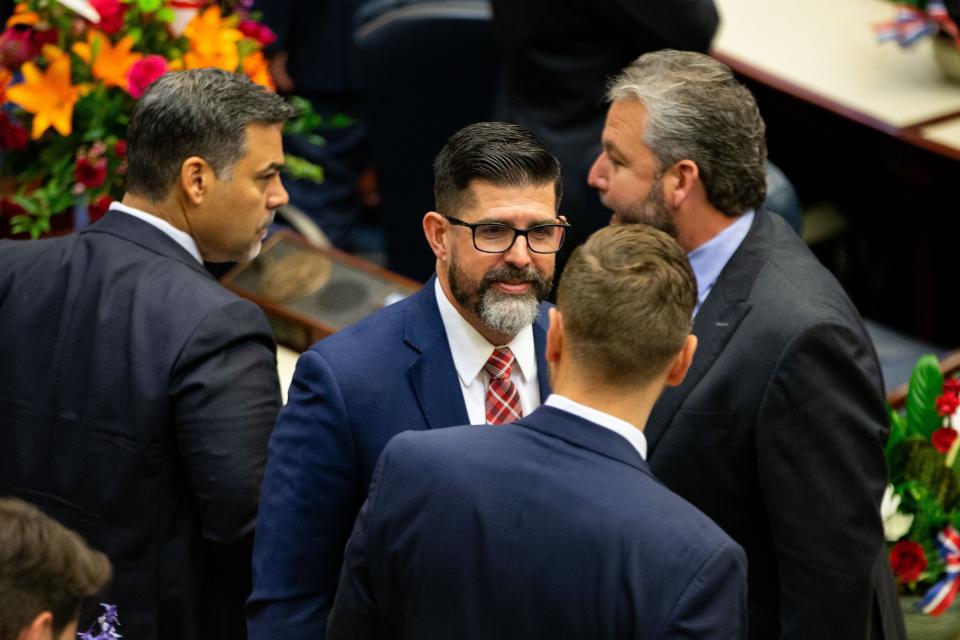Florida Board of Education votes on guidelines on bathrooms, pronouns
Further restrictions in and out of the classroom could negatively impact LGBTQ students going into the school year following the approval of several amendments and a new rule at a Wednesday Florida Board of Education meeting.
Four amendments and one new rule lay out further guidelines to align with recently passed legislation related to the use of bathrooms, classroom instruction and admission of minors to adult performances.
Two amendments address educators specifically, while two others detail guidelines for how districts must treat LGBTQ students who wish to go by a different name or use a bathroom that does not match their sex assigned at birth.

And a new rule touched on extracurricular activities and events, barring districts from taking students to or hosting "adult live performances" — something both those for and against the rule believed would pertain specifically to drag performances.
"We're fortunate to live in a state that is not forcing our teachers and students to recognize an individual's pronouns in a classroom setting that (are) opposite of the individual's biological sex at birth," said Florida Department of Education Commissioner Manny Diaz Jr. "It's important here in Florida that we fight for truth and sanity. Today will be another step in that direction."
Diaz was not present for most of the meeting held in Orlando, and multiple board members called in remotely.
How students are affected
House Bill 1521, which went into effect July 1, already requires that restrooms and changing rooms in publicly owned buildings, including schools, must be segregated by sex assigned at birth if a unisex option is unavailable. An amendment approved Wednesday provides updated language related to K-12 education aligning with this law and strikes through previous requirements for restrooms and changing facilities in schools.
The amendment requires that school districts and charter schools update their student codes of conduct create punishments for those who don't comply and certify to the Department of Education that all of their schools are in compliance. Additionally, districts will be required to create disciplinary procedures for employees who violate the law or the Principles of Professional Conduct for the Education Profession.
Each district must fill out a form provided by the Department of Education that certifies that they have either unisex restrooms and facilities or restrooms and facilities segregated by sex. They must also certify that the student code of conduct has been updated to include language designating bathrooms by sex assigned at birth and laying out punishments for those who break the rules. Districts must submit the form to the Department of Education by April 1, 2024.
Those in favor of the amendment argued that it would "let kids be kids" — a phrase repeated throughout the hours-long meeting — and that it would keep girls safe.
"One hundred years from today, when someone wants to examine our remains, they will be able to determine if you were born a man or a woman based solely on your X and Y chromosomes," Robert Goodman said during public comment. "We live in a time where common sense is no longer common. Thank you for bringing it back."
Many LGBTQ community members and allies said they understood the board was making the rules to be in compliance with the new law, but asked that they create measures to protect transgender teachers and kids like requiring schools to have multiple accessible unisex bathrooms, or avoid harsh punishments for those who used the bathroom that aligned with their gender but not their sex assigned at birth.
"If you're going to rob trans people of their dignity, at the very least you should ensure their safety."," one Central Florida mother said, adding that schools should have specific plans in place related to how to respond to harassment toward transgender kids.
Board of Education on Black history: Florida board OKs Black history standards, rejects concerns about omitting 'key' facts
'Thought I'd squeaked by': Transgender Floridians grapple with lack of medical care
Another amendment laid out guidelines that a child may not use a preferred name without a parent or guardian's permission for the use of “any deviation from their child’s legal name in school.” It adds that districts will create a form to obtain parental consent and any required documents.
Paul Burns, chancellor of the Florida Department of Education, noted that there are already processes in place for parents of children who wish to go by nicknames.
Matthew Woodside, a Brevard teacher of 17 years who has been outspoken locally against LGBTQ issues, was in favor of the amendment. He added that he has used "harmless, benign nicknames" for his students, but that he felt the amendment was necessary because the number of transgender students has "skyrocketed" in recent years.
"Many students are attempting (to go by a different name) without the knowledge of their parents, and many schools are complicit in this scheme, keeping this information from these parents, undermining the God-given rights of the parents," he said.
"When something as sensitive as a student wanting to be called by a name of the opposite sex occurs, we must recognize that these students are minors. They are minors, and their desire for autonomy and secrecy will never trump the rights of parents to raise their child with full knowledge of who they project to be at school."
Students and teachers are also not allowed to go by chosen names or pronouns that do not align with their sex assigned at birth, according to an amendment to the state's Principles of Professional Conduct for the Education Profession in Florida.
What about educators?
Two amendments that were unanimously passed addressed teachers, with one updating the state’s Principles of Professional Conduct for the Education Profession in Florida and the other updating the Florida Educator Accomplished Practices.
Both amendments addressed the incorporation of HB 1069, though the amendments to the Principles of Professional Conduct went into more specific details about how teachers should conduct themselves according to the new law, while the other amendment gave broader instruction to provide students with classrooms that are “age and developmentally appropriate and aligned to the state academic standards.”
Books under fire: Florida schools struggle to apply new book law in which even Shakespeare is 'suspect'
Brevard book review committee halted: 'Stop banning books': Protesters rally at Brevard Public Schools' district office
Previously, restrictions were only in place for K-3 teachers. The amendment passed Wednesday expanded certain aspects of these restrictions through all grades. Teachers of pre-K through grade 8 students may not provide classroom instruction on sexual orientation or gender identity except when required by certain sections of the law. For those teaching grades 9 through 12, they may not provide instruction on sexual orientation or gender identity unless it’s required by state academic standards or is part of a reproductive health lesson. The amendment notes that parents or guardians can opt their children out of these lessons.
The amendments also laid out guidelines preventing educators from using bathrooms that do not match their sex assigned at birth and restricting them from going by a name or pronouns that do not match their sex assigned at birth. They are also not allowed to refer to students by preferred names or pronouns.
Those in violation of the law could face revocation or suspension of their educator’s certificate, or other penalties.

New rule on extracurriculars
A new rule lays out the guidelines for districts related to school-sponsored events, activities and extracurriculars, saying that these events must be consistent with Florida’s Parental Bill of Rights and may not admit a child to an adult live performance.
Districts are also not allowed to authorize the use of district-owned or leased property for adult live performances. Additionally, parents must be notified prior to events and be fully informed of the details of the event, with districts now required to get signed permission forms for the activity.
Neither the rule nor the law from which it drew its language — Senate Bill 1438 — specifically referenced drag, with the bill defining adult live performances as "any show, exhibition or other presentation that is performed in front of a live audience and in whole or in part, depicts or simulates nudity, sexual conduct, sexual excitement, specific sexual activities, … lewd conduct, or the lewd exposure of prosthetic or imitation genitals or breasts."
But LGBTQ advocates have expressed concerns about the law targeting drag following the sponsor of the companion House bill, State Rep. Randy Fine, specifically referencing drag multiple times during the legislative process.
Those both for and against the new Board of Education rule focused almost solely on drag events and gay-straight alliance clubs. Those for the new rule argued it would prevent children from being exposed to sexual activity, while those against it said it could rip away access to safe spaces for closeted students.
Will Larkins, a graduate of Winter Park High School, said they ran the gay-straight alliance while they were a student. They fear students with unsupportive parents would no longer have access to these spaces, or that students would be forced to out themselves to family if they're required to get a permission slip signed to attend extracurricular activities.
"I talked to you earlier today, and I asked, 'Will this provision make it so that GSAs require a permission slip?' And you told me yes," they said, addressing the board.
"We had several students who were living homeless at 16, 17 years old because their parents kicked them out of their house for being gay, for being trans. Their parents are not going to sign that permission slip, but these students only found solace in this community, this after-school activity."
It was not clear how these new guidelines would be enforced within individual school districts.
The Department of Education did not respond to request for comment when FLORIDA TODAY reached out Wednesday afternoon.
"There is no higher calling than to protect our children from unwelcome influences and indoctrination," Diaz said in a press release from the department.
"The rules adopted today ensure that our kids can be kids while in the care of our schools. I thank Gov. Ron DeSantis, the Legislature and the State Board of Education for their unwavering commitment to the health, wellbeing and safety of our students."
Finch Walker is the education reporter at FLORIDA TODAY. Contact Walker at 321-290-4744 or fwalker@floridatoday.com. Twitter: @_finchwalker.
This article originally appeared on Florida Today: Guidelines by Florida Board of Education impact LGBTQ students, teachers

